OM in Chukotka
Winter 2024. The very beginning of the year – still somehow both new and yet very stale after the New Year celebrations. The Chukotka Autonomous Okrug came under the scope of “Omelchak Multimedia Studio,” and like all other regions of our country, it needed to be showcased in all its glory at the exhibition “Russia – the Land of Achievements.” We have already written here about our visit to the capital to walk through this vast exposition (https://www.omelchak.com/blog/om-na-vystavke-rossiya-strana-dostizhenij/).
Besides the educational purpose of visiting the exhibition, there was another – we wanted to get to the Chukotka stand, for which we had been creating content for several weeks. During our work with the Chukotka Autonomous Okrug (ChAO), we grew to love this region as much as one can without ever having been there. Our staff dreamed of the endless white expanses of the northern seas locked in ice, the cold breath of snow-covered hills, the majestic calm of Chukotka’s landscapes.
The Chukotka stand turned out great. And the region quietly became a dream for many of our employees. A dream of a special kind of freedom, of vast spaces and salty winds, of the wisdo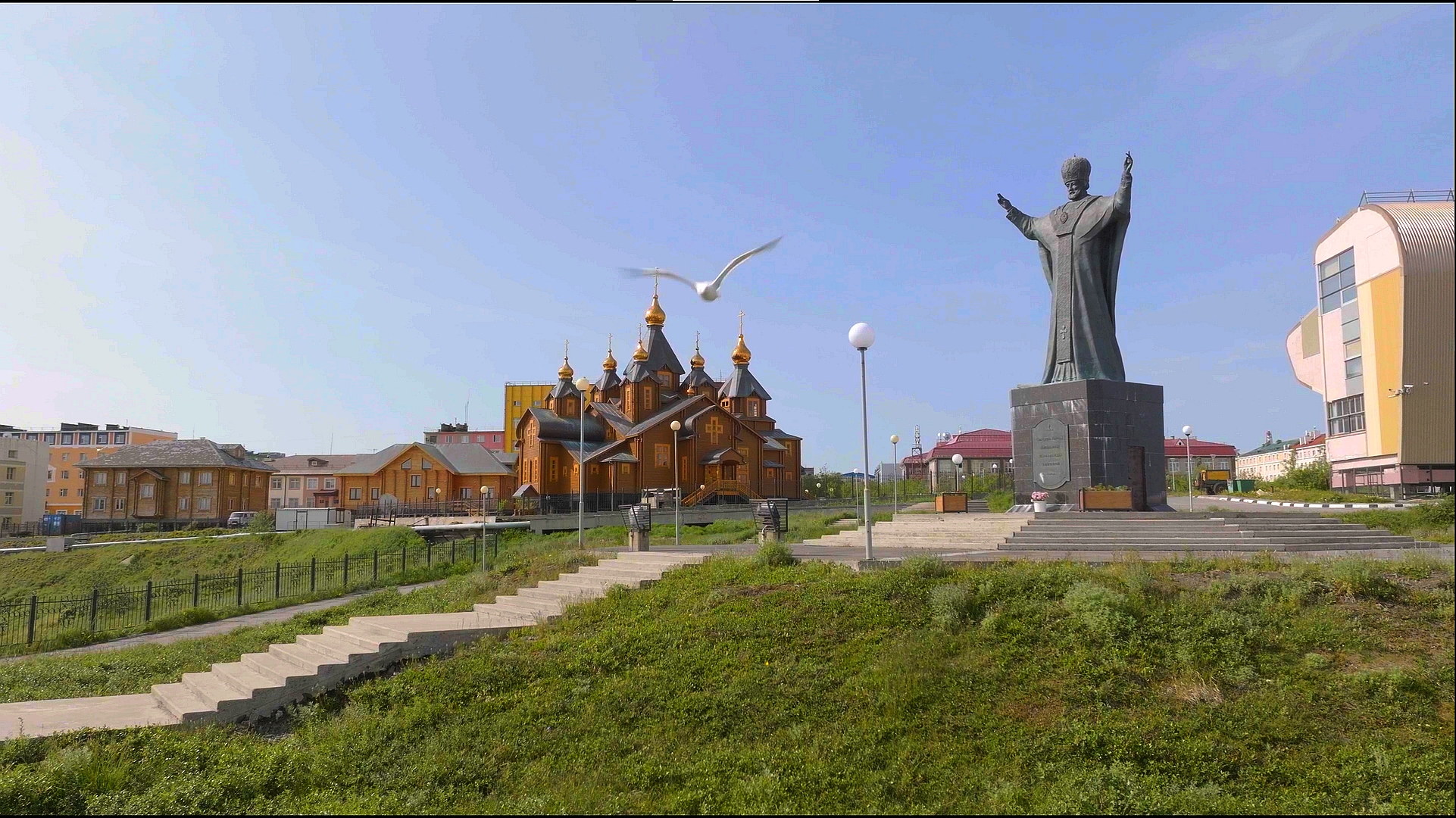 m of ancient land forever hiding its secrets in the eternal permafrost…
m of ancient land forever hiding its secrets in the eternal permafrost…
Chukotka responded. In May, the filming crew of “Om Studio” set off for the Bilibino district of ChAO. And two months later – on an almost two-week business trip to Anadyr.
It is difficult to describe this expedition in sequence. It was a long, very warm, bright, and incredibly beautiful adventure, about which at first you want to tell everyone, and then – on the contrary – to fall silent and keep inside what you brought back with you. What soaked somewhere into the solar plexus and remained inside us. Transparent Chukotka winds, the high, changeable sky, boundless expanses, silence, and some special kind of peace…
Next are the words that wanted to become lines and could no longer be held inside. Perhaps you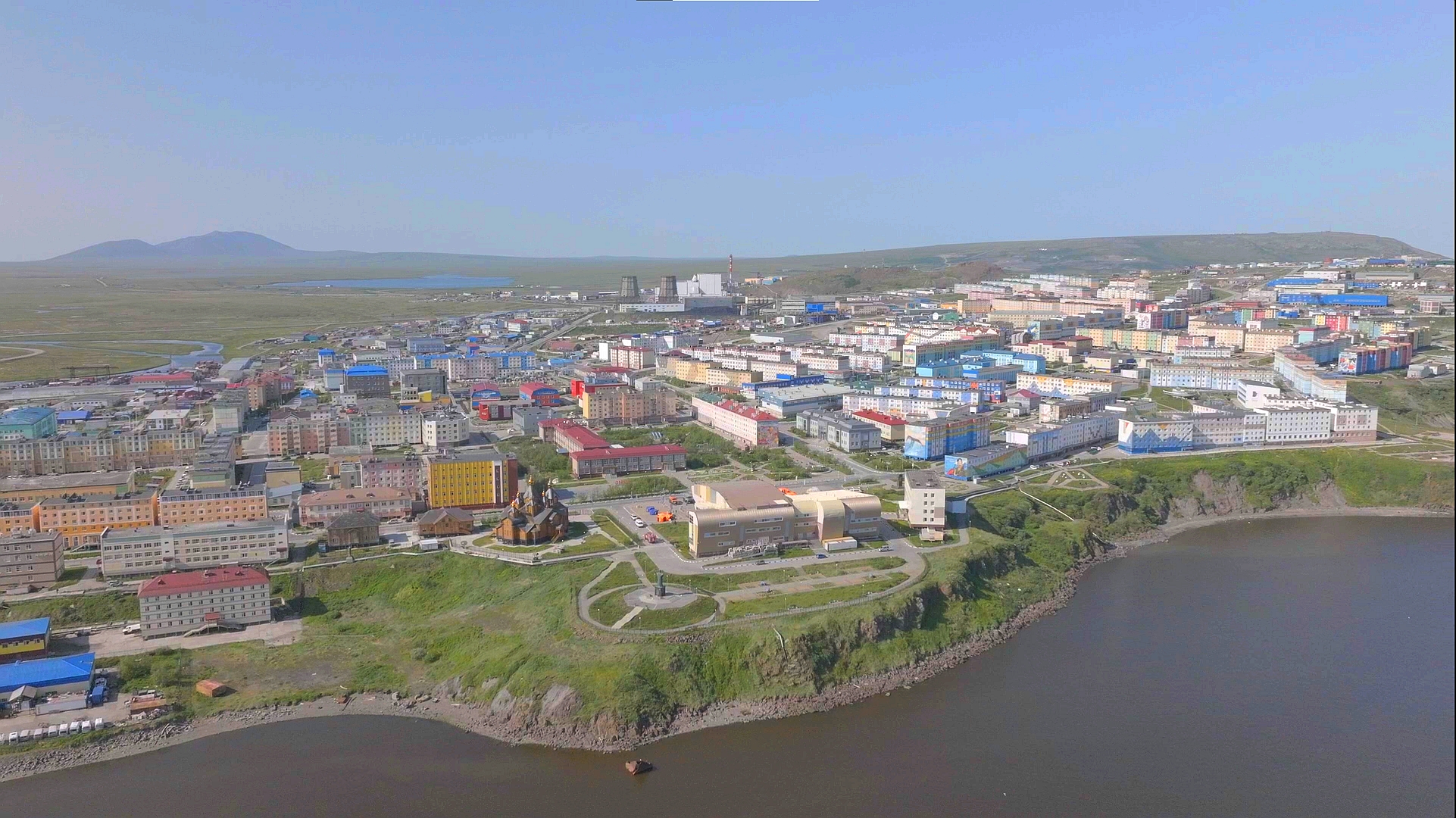 too will feel something that touches and moves you and calls for a meeting. And then… see you in Chukotka!
too will feel something that touches and moves you and calls for a meeting. And then… see you in Chukotka!
* * *
Windy weather is commonplace in Chukotka. Here the wind is not merely a guest in weather forecasts. It is the free master of free land. It is not waited out, it is lived with. It is not ignored, but respected.
And there is no more anxiety, no fear, no doubt. Silence within. Even time has ceased to make sense, lost control, and dissolved. And you – are not tiny or insignificant. You are Equal. Strong. Both filled and empty at once. Leader and follower. Cause and effect. Wanderer and guiding star.
Gudym, or The Future That Became the Past
We quickly lost track of the days. Sometimes, in the evening over dinner, we could hardly believe that everything we had seen, filmed, done, had happened all in one day. There is no time in Chukotka. Nothing depends on it. A single day can stretch on for weeks, especially s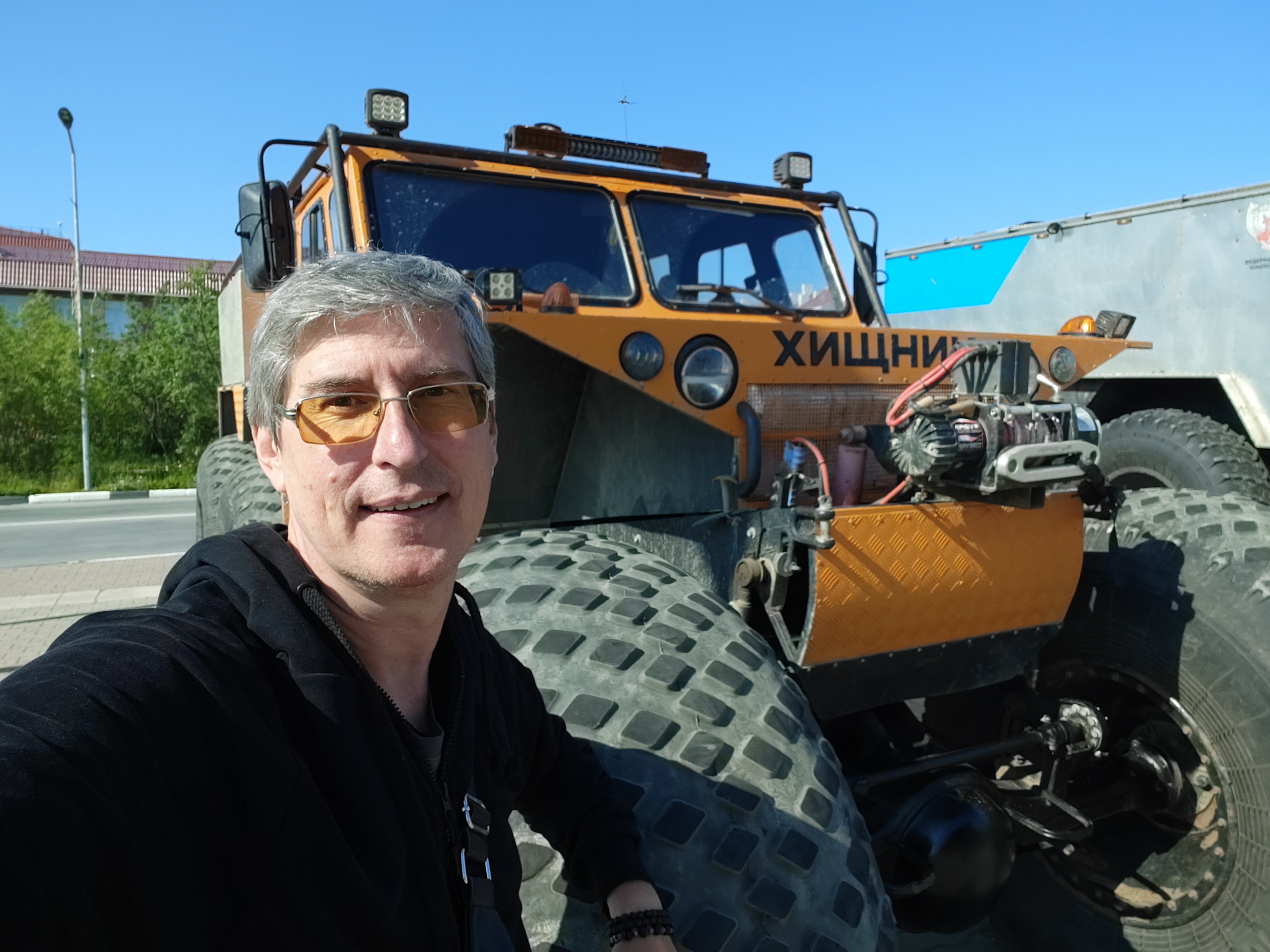 ince it hardly gets dark in summer and hardly bright in winter… To avoid confusion, we won’t name the days.
ince it hardly gets dark in summer and hardly bright in winter… To avoid confusion, we won’t name the days.
Let us say this instead:
One day, we went somewhere. Again. At the meeting point, a huge orange swamp buggy was waiting for us. Six gigantic wheels, and surprisingly comfortable cabin.
After just a few minutes of driving, we turned toward the shore, where a large barge stood with its blunt bow buried in the sand. Crossing the bay on it was neither long nor frightening – despite the wind, the sea did not churn but only wrinkled and squinted at the sun. In literally half an hour, we found ourselves on the opposite shore, where immediately our striking landing force – a tourist group on quad bikes and a red all-terrain vehicle – disembarked and set off along the dusty dirt road.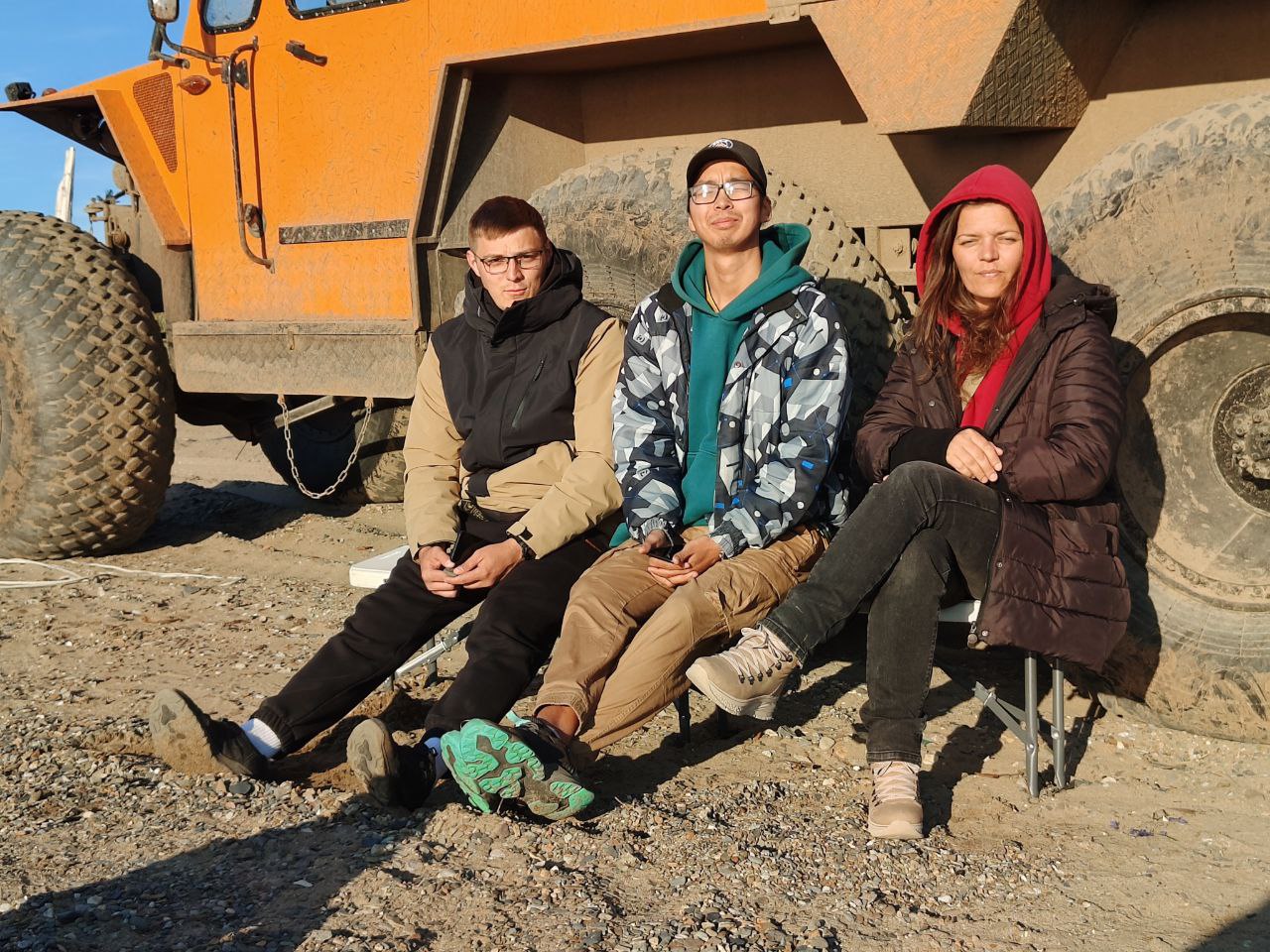
The green expanses on this side of the bay looked inviting only from afar. Up close, amid the short but wild, blooming, living Chukotka summer, many sad relics of a distant past hid… By the roadside, a plane battered by winds, crucified by bushes long since piercing its skin on the way to the sun.
No one remembers anymore whether it crashed here, made an unsuccessful landing, or was deliberately brought and abandoned.
In the midst of the boundless, blooming tundra, suddenly – a battle tank. Its barrel torn into several par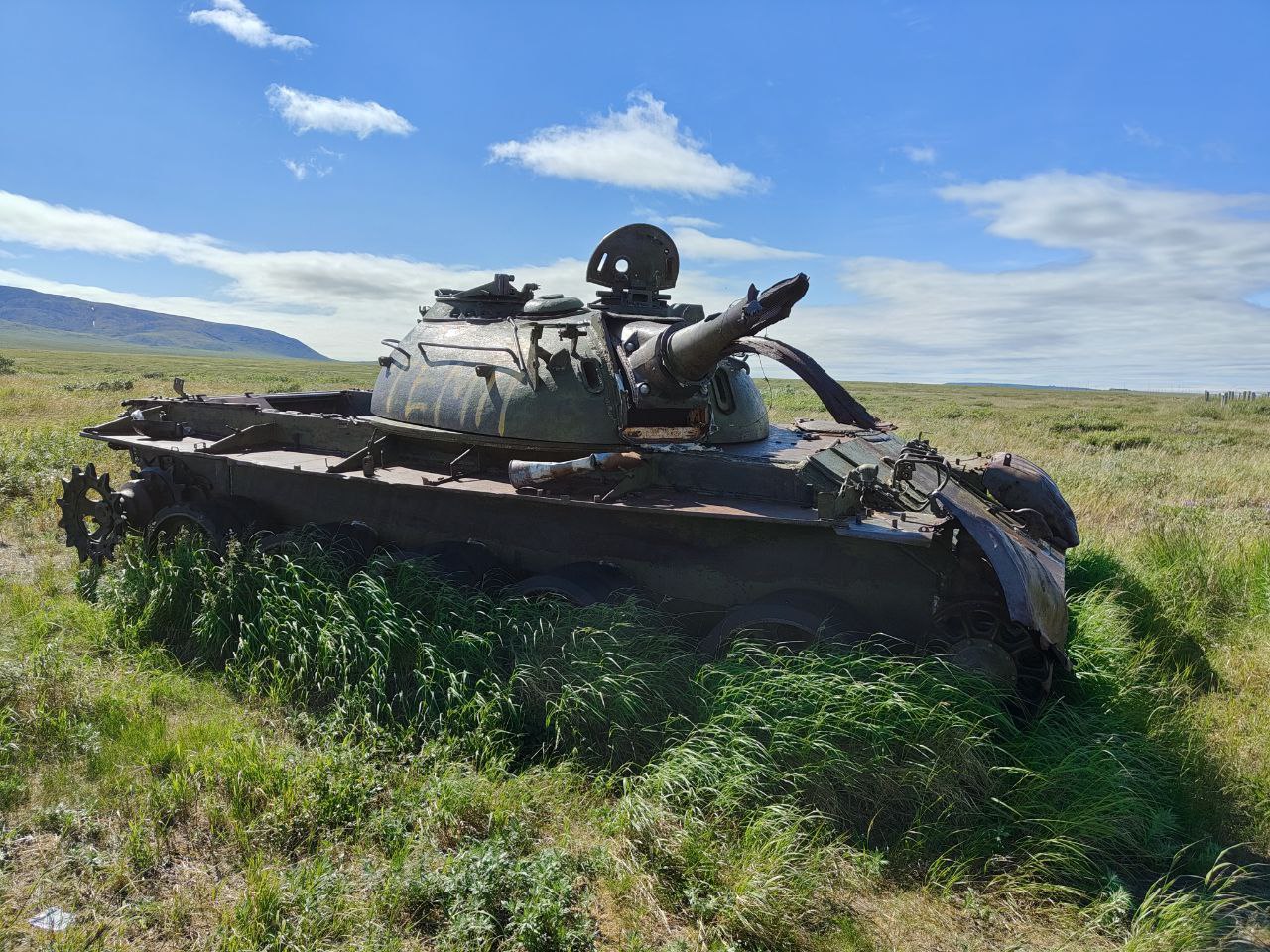 ts and resembling a strange metal flower forged by a drunken blacksmith. Painted on its hull: “Farewell to Arms.” This machine, forever rooted in Chukotka’s soil, will one day become part of it, disappearing without a trace. For now, by its presence, it marks the territory of a former military tank testing ground.
ts and resembling a strange metal flower forged by a drunken blacksmith. Painted on its hull: “Farewell to Arms.” This machine, forever rooted in Chukotka’s soil, will one day become part of it, disappearing without a trace. For now, by its presence, it marks the territory of a former military tank testing ground.
Another hour of racing the all-terrain vehicle and quad bikes across the open spaces and off-road – and we arrive at a post-apocalyptic settlement. Through the mud-splattered puddled windows of our swamp buggy, ruins come into view. We pass by toward the only remaining concrete building hidden at the foot of a hill.
This is Gudym. A former secret underground nuclear base near Anadyr, once armed with intercontinenta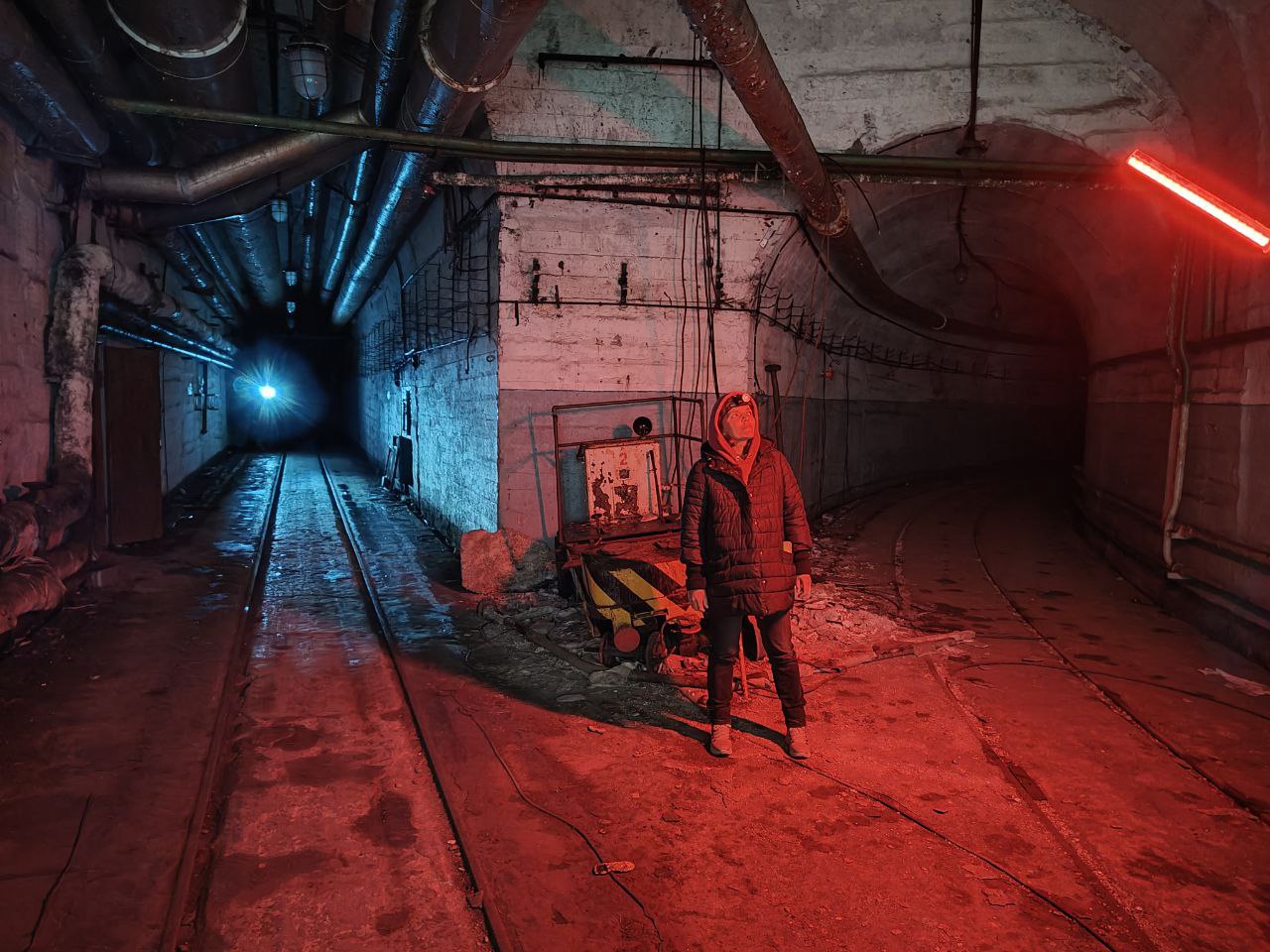 l ballistic missiles aimed, as is now said, at hostile countries.
l ballistic missiles aimed, as is now said, at hostile countries.
The base was closed, the military removed everything, then destroyed the village that once stood there. The underground structures were left intact. Probably because it is nearly impossible to demolish them—they were built to withstand a direct nuclear strike.
Deep inside the Chukotka hill runs a long tunnel with many branches. They say there are several more levels below, but these were flooded with water, immediately sealed in ice by the permafrost.
The place is highly atmospheric. W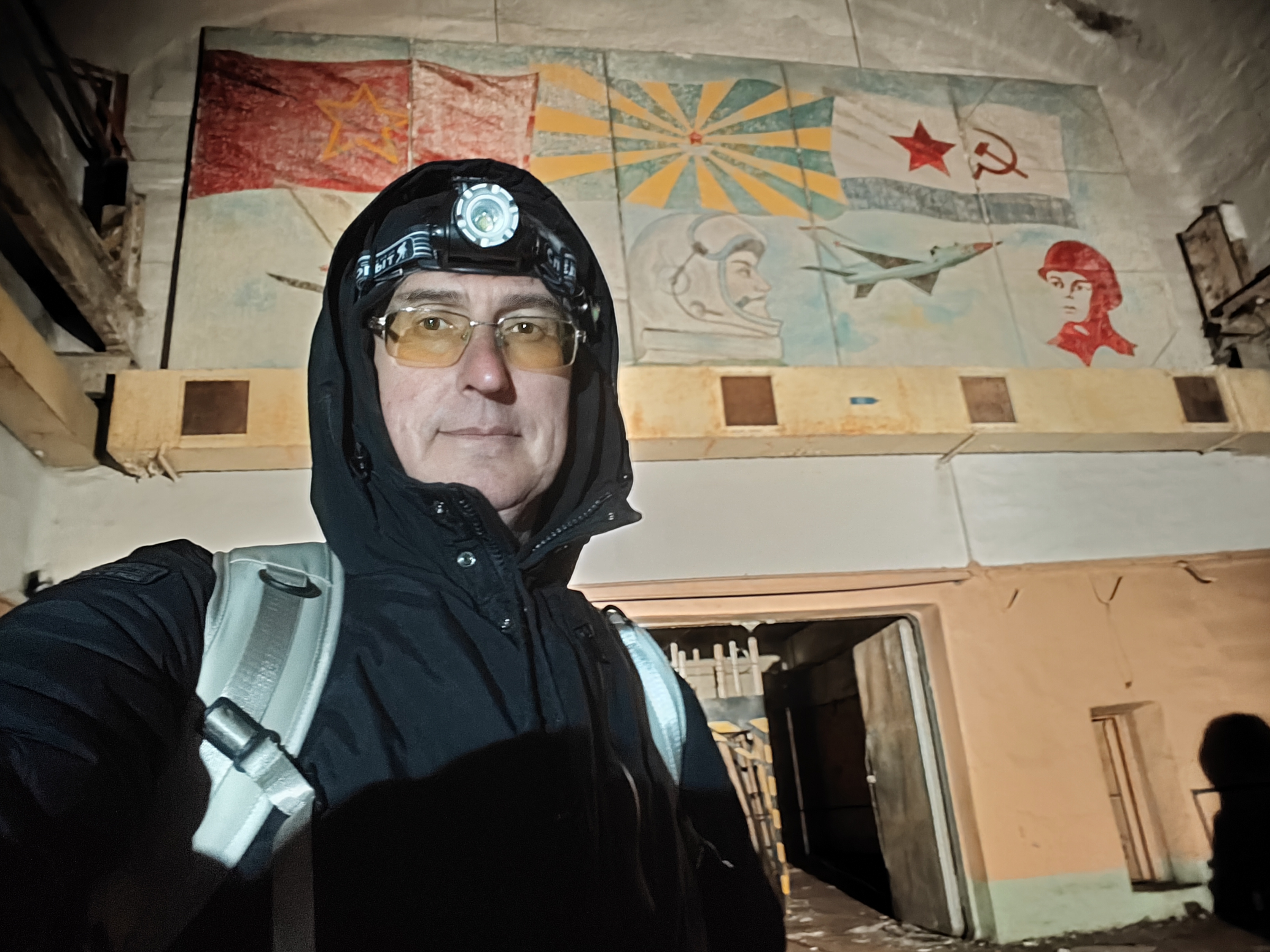 ildly cold, utterly dark, and honestly, very unsettling. Kostya and I walked down the tunnel, a little behind our companions, imagining what could be done here to boost tourism. Of course, the first thing that comes to mind is ghost stories. It’s one thing to invent them while sitting somewhere in a sunny world, and quite another in the darkness of an icy underground.
ildly cold, utterly dark, and honestly, very unsettling. Kostya and I walked down the tunnel, a little behind our companions, imagining what could be done here to boost tourism. Of course, the first thing that comes to mind is ghost stories. It’s one thing to invent them while sitting somewhere in a sunny world, and quite another in the darkness of an icy underground.
“Imagine setting up a good subwoofer here and periodically playing a deep, indistinct hum!” Kostya immediately made a guttural growl.
“And then—hop—somewhere in the dark—a soft children’s laughter…” I hadn’t even finished speaking when the hairs on the back of my neck stood up...
Russian Cat
We arrived at the pier exactly as planned — at eight in the morning. It was sunny, as it had been the entire time we’d been here. The polar day is a strange thing. You never know what time it is — it’s always light. We were especially happy and excited about the line in the permit for using drones during filming: “…allowed during daylight hours.”
Taking a wrong turn, we accidentally left the path and ended up in the bushes. The mosquitoes, sleeping in the shady greenery, immediately woke up hu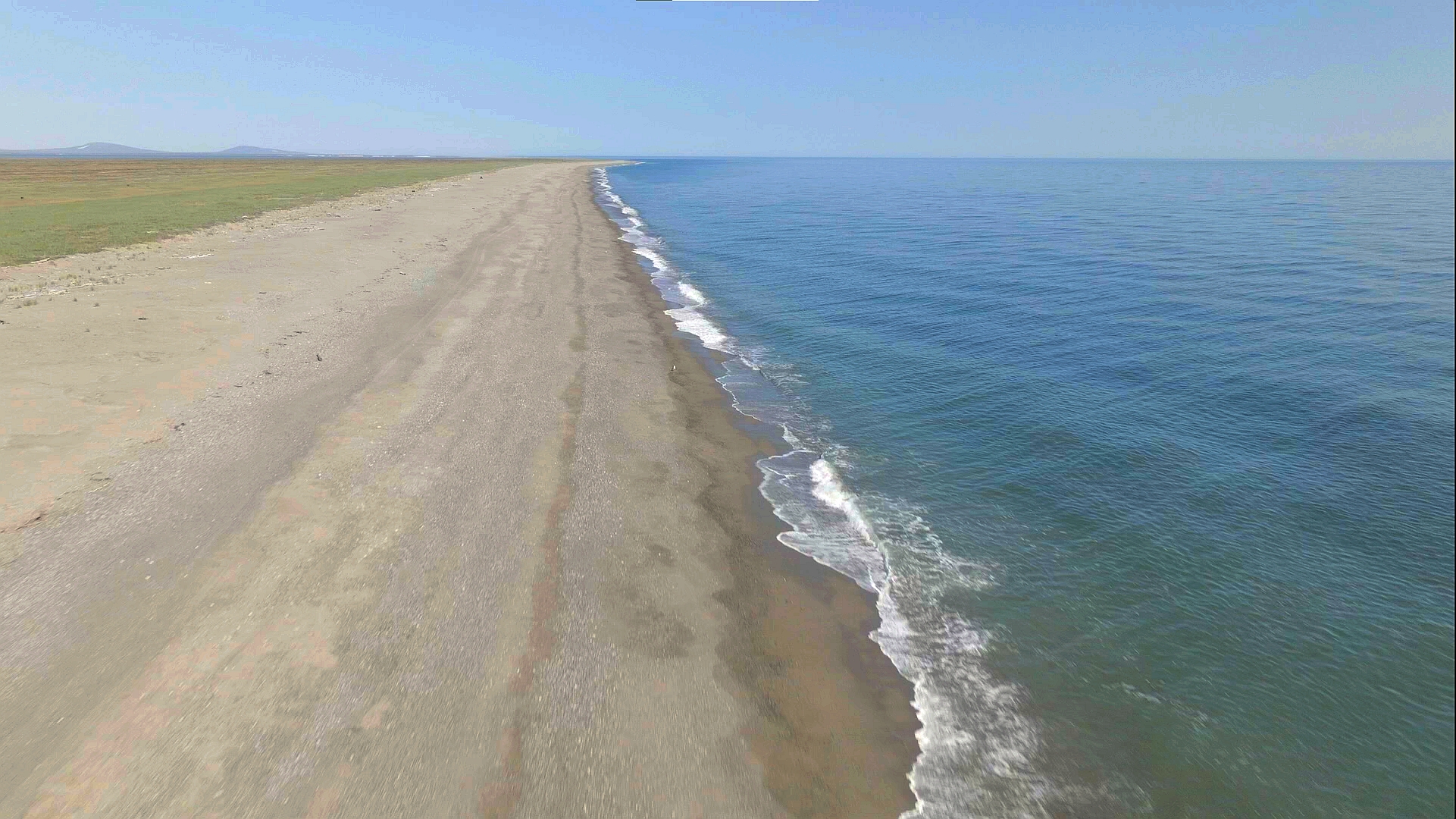 ngry and formed a “swarm” in front of us. We quickened our pace. Just yesterday we were afraid that the small, old boat would take us somewhere unknown across the seas. The hordes of mosquitoes distracted us so much that we didn’t even notice how we got into the boat and quickly set out into the bay. The white, but clearly well-used motorboat growled and trembled as it moved past the piers, rusty barges forever stuck on invisible shoals, and concrete cliffs, heading into the wind.
ngry and formed a “swarm” in front of us. We quickened our pace. Just yesterday we were afraid that the small, old boat would take us somewhere unknown across the seas. The hordes of mosquitoes distracted us so much that we didn’t even notice how we got into the boat and quickly set out into the bay. The white, but clearly well-used motorboat growled and trembled as it moved past the piers, rusty barges forever stuck on invisible shoals, and concrete cliffs, heading into the wind.
We had been sailing for about an hour. “Oh, the waves have changed. We’re in the ocean now…” the captain turned to us at the stern. He didn’t need to shout — the wind carried his words clearly, making us suddenly feel cold and alone in the vast world. The sea around really had changed. The boat stopped shaking and bouncing. The waves no longer splashed and crashed but rose and fell slowly, as if something incredible was breathing deeply and evenly in the blue abyss. We calmed on our stern, nervously turning our heads from side to side. Calm freedom and majestic vastness, strength and wisdom — everything around was exactly as it should be. Exactly as it always was and always will be.
We didn’t notice when our fear faded away. Nothing seemed significant or important anymore. We were part of a vast ancient power, a fusion of elements. Equals. Free. Calm and wise. The very acceptance, the unconditional love we had felt from the Chukotkan land in the snowy hills during the previous filming expedition became almost tangible now — not frightening, but weaving millions of threads of happiness and peace through us. Ahead, the shore appeared. The Russkaya Koshka spit. That was where we were sailing.
Russkaya Koshka spit was discovered and named in 1651 by Semyon Dezhnyov. It is 16 kilometers long an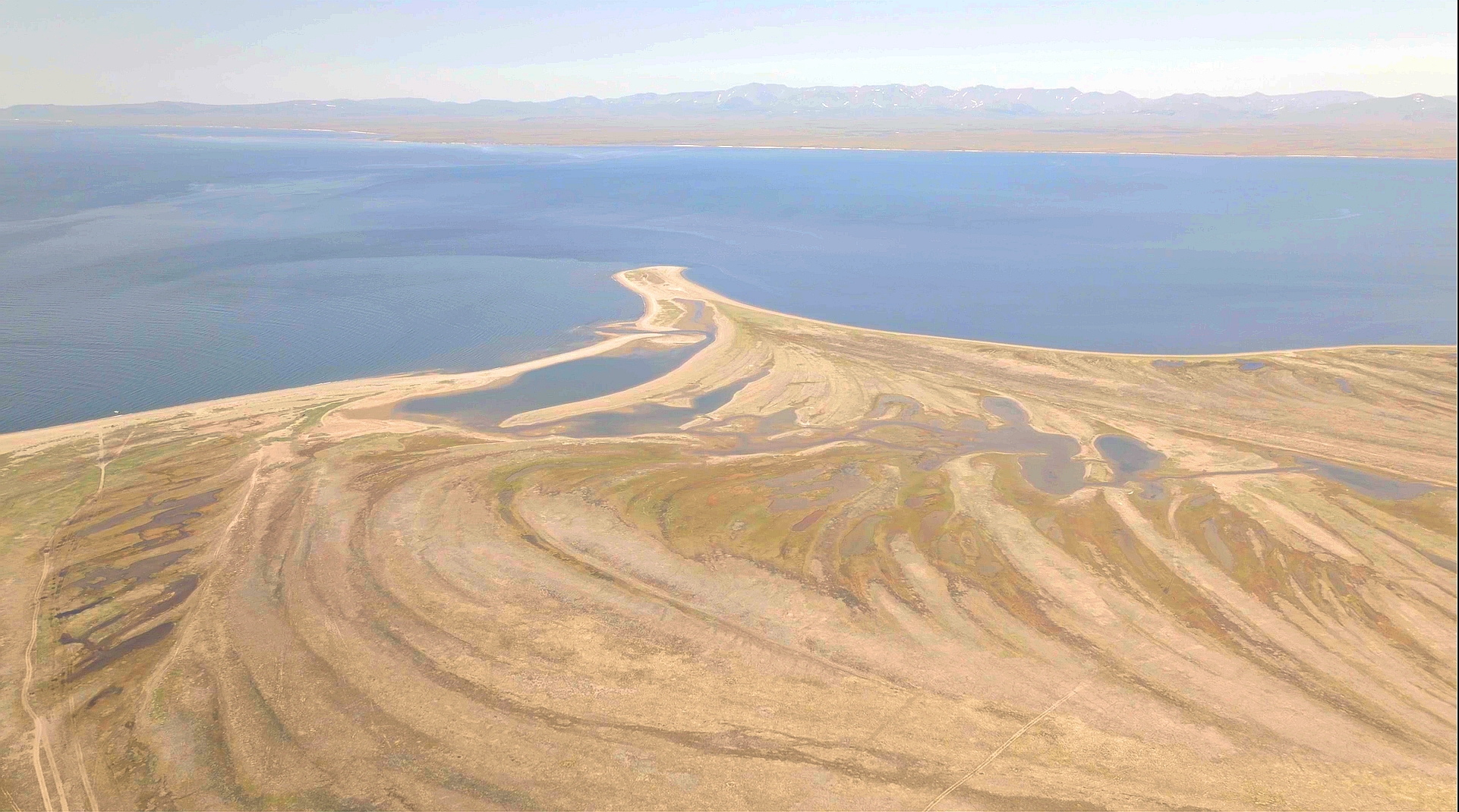 d only 2 kilometers wide. A deserted, uninhabited place — an endless sandy shore, in the middle of which lies a huge whale skull, bleached by the sea and salty winds. Beyond that — bright green tundra, buzzing with every mosquito in the world, shrouded in a blue haze. Amid this living landscape, an overturned rusty barque resting on its side looks very strange against the distant Chukotkan hills. While the director panicked and sprayed vanilla scent (they say it helps repel insects), the cameraman wandered along the shore. The seemingly peaceful scene immediately changed. From nowhere, hundreds of white birds resembling large swallows took off from the sand into the sky. These were Arctic terns — the only birds in the world that annually migrate from the Arctic to Antarctica and back. Imagine: during their lifetime (20 to 25 years on average), an Arctic tern covers a distance equal to three trips from the Earth to the Moon!
d only 2 kilometers wide. A deserted, uninhabited place — an endless sandy shore, in the middle of which lies a huge whale skull, bleached by the sea and salty winds. Beyond that — bright green tundra, buzzing with every mosquito in the world, shrouded in a blue haze. Amid this living landscape, an overturned rusty barque resting on its side looks very strange against the distant Chukotkan hills. While the director panicked and sprayed vanilla scent (they say it helps repel insects), the cameraman wandered along the shore. The seemingly peaceful scene immediately changed. From nowhere, hundreds of white birds resembling large swallows took off from the sand into the sky. These were Arctic terns — the only birds in the world that annually migrate from the Arctic to Antarctica and back. Imagine: during their lifetime (20 to 25 years on average), an Arctic tern covers a distance equal to three trips from the Earth to the Moon!
It turns out their nests are hidden right here, under our feet. So the birds immediately rushed to defend their offspring. Very, very aggressively. Hitchcock would have envied their genuine ferocity. More and more terns gathered over our heads each second, screaming and diving from the sky right at us. The cameraman cursed and ran but still managed to shoot a skillful and dynamic video — which, for ethical reasons, cannot be shown publicly.
The swarms of enraged birds gave rise to fiery, intricate curses that even made our dark-skinned captain blush noticeably.
After shaking off the terns, we set off along an old bumpy road deeper into the spit. Our brave drone flew over the tundra. When filming with the camera head fully down, the footage looks incredible — it’s hard to tell at first glance whether it’s an unknown green planet with continents, 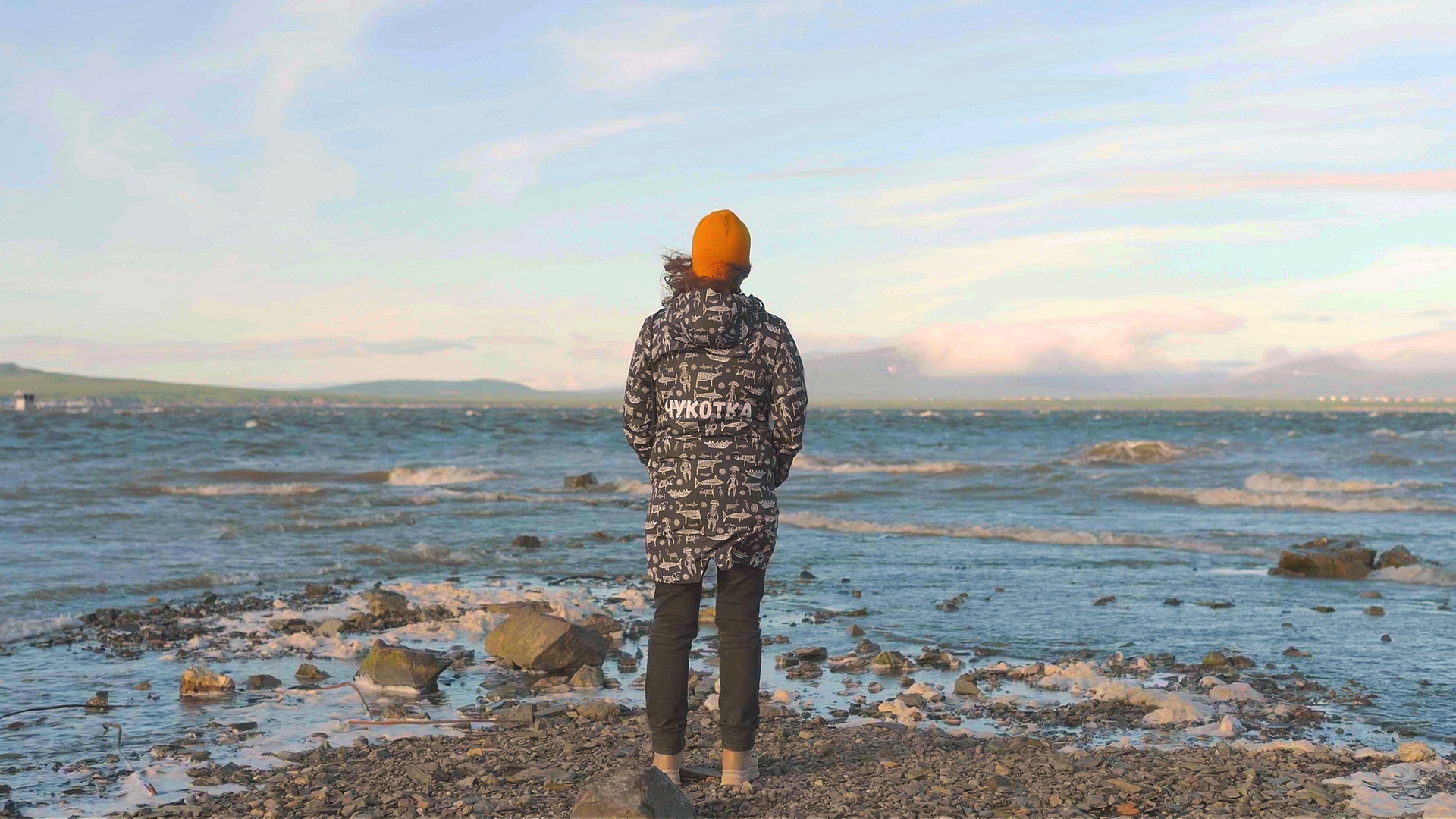 islands, seas, and oceans or a strange abstract picture of every shade of green.
islands, seas, and oceans or a strange abstract picture of every shade of green.
- Vasya! — the captain’s shout echoed against the old walls of old buildings, so tightly rooted in the tundra they seemed like dozing, stooped creatures. — Vaaaasya!
The buildings looked strange, their purpose was unclear to us, and we longed to return to the shore, to the sea expanse where everything seemed more understandable. Besides, our boat was there, rocking on the waves, held by anchors.
Suddenly, a door in one of the leaning buildings swung open. A cozy bearded man stepped out onto the green lawn, squinting in the sunlight, holding a bucket. “Hello! — Vasya, and it was indeed him, smiling, approached us. — Have you seen the bear? It was here this morning.” We really wanted to believe “bear” was a proper name, not a tender nickname for an animal. However, judging by the cautious glances of our companions scanning the surroundings, a real, huge bear — as all things Chukotka-sized — had been wandering the area a few hours earlier. “Maybe come inside?” Vasya smiled at Leopold, sensing our fears. No persuasion was needed. We stepped through the low, dark doorway smelling of diesel, dampness, and some kind of food.
Vasily has lived and worked here, on the Russkaya Koshka, for several decades. What exactly his duty entails – we never quite understood; it seemed his main task was simply to be here. Refusing tea, we wandered after the master of the spit through the nooks and crannies of his strange work-home, said warm goodbyes, and set off along the now familiar road back tow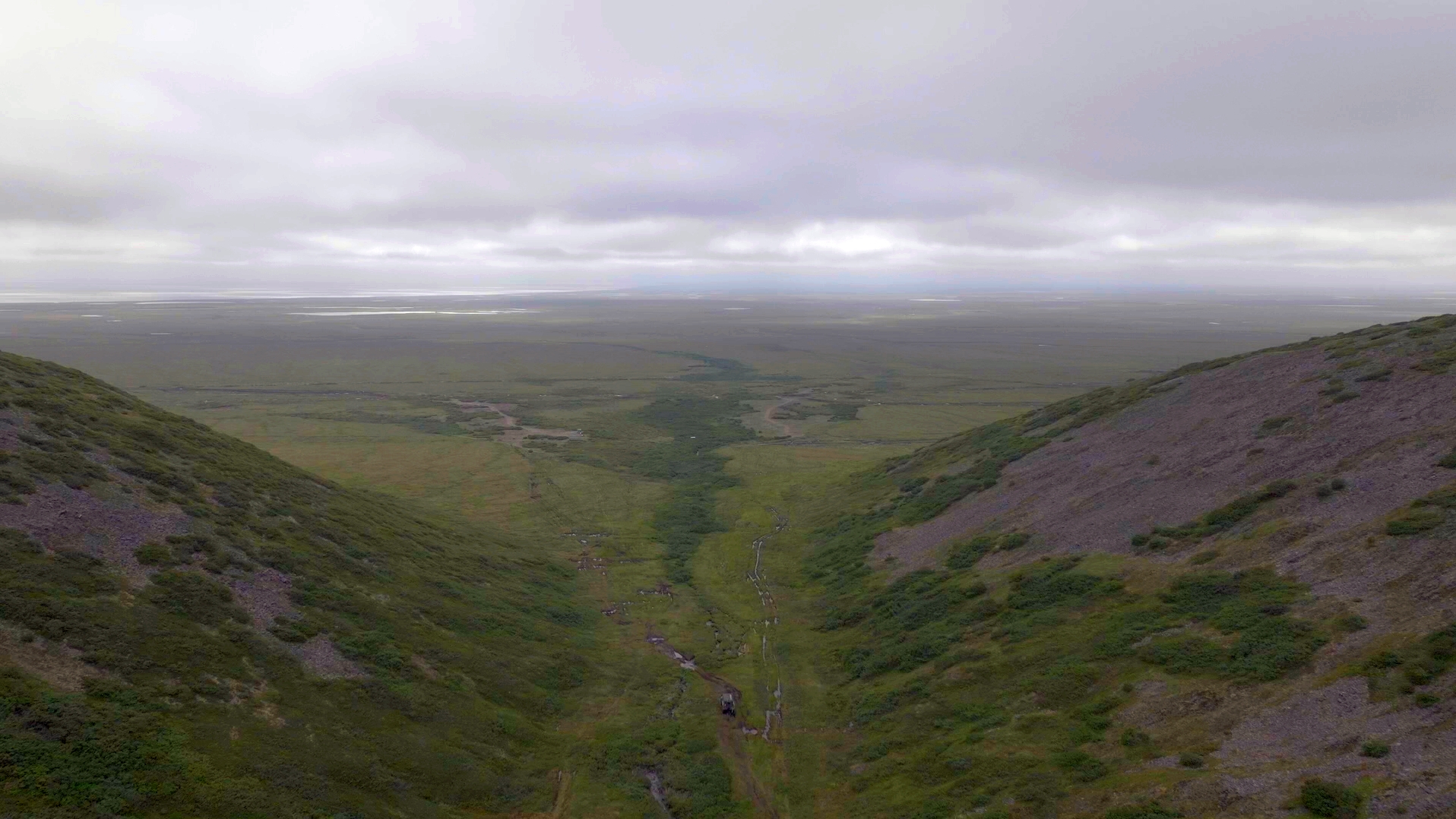 ard the sea.
ard the sea.
The sun of the polar day burned in a way that was anything but polar. Above the endless tundra on both sides of the road, a strip of bluish haze shimmered, and distant hills wrapped themselves in a moist, murky mist. We dragged ourselves along the road, dreaming of being in the boat soon, cooled by the sea breeze. Suddenly, the captain stopped, peering off to the side. “Wait, I don’t remember that object over there,” he nodded in the direction. “And now it seems to me that it’s a bear. What about you?” A BEAR?! So, a huge wild bear is out there, coming toward us?!... Around us stretched kilometers of sandy spit, tundra, and Vasily inside his thick-walled fortress. Confused and still hoping to see some sign of humor on the captain’s face, we stood rooted, unsure what to do. The noticeably pale captain threw a round plastic buoy — a gift from Vasily — into the sand and, without taking his eyes off the dark spot in the green tundra, quickly issued instructions. And flares. Small ones (especially compared to the bear) with a string that, when pulled, ignited a burning torch meant to scare the animal away. “Don’t run, don’t look the animal in the eyes, but keep it constantly in your peripheral vision.” The captain was utterly serious yet calm despite his paleness. “It works well when you start moving around the bear with the torch…” The words of a native Chukchi echoed in our heads. We tried very hard to walk slowly, not to panic, not to tremble, and “not to show the bear our fear.” The unknown figure was clearly moving toward us; it seemed we could make out how the huge brown paws were stepping confidently and deliberately on the soft green grassy carpet. We wanted to run headlong, throwing bags, cases, flares, and jackets into the dust. Run to the sea, then into the boat — and get out of here. As if overhearing our thoughts, the captain quietly muttered, “Bears are very good swimmers!” Suddenly, the fear vanished. It became funny and a little sad — nowhere to go, no way to swim away, nowhere to hide. We tramped along the road, mentally preparing to circle the bear with flares, not to be afraid, and to control it without looking it in the eyes. There it was — the shore. With birds already alarmed by our approach. The captain stopped and stared into the distanc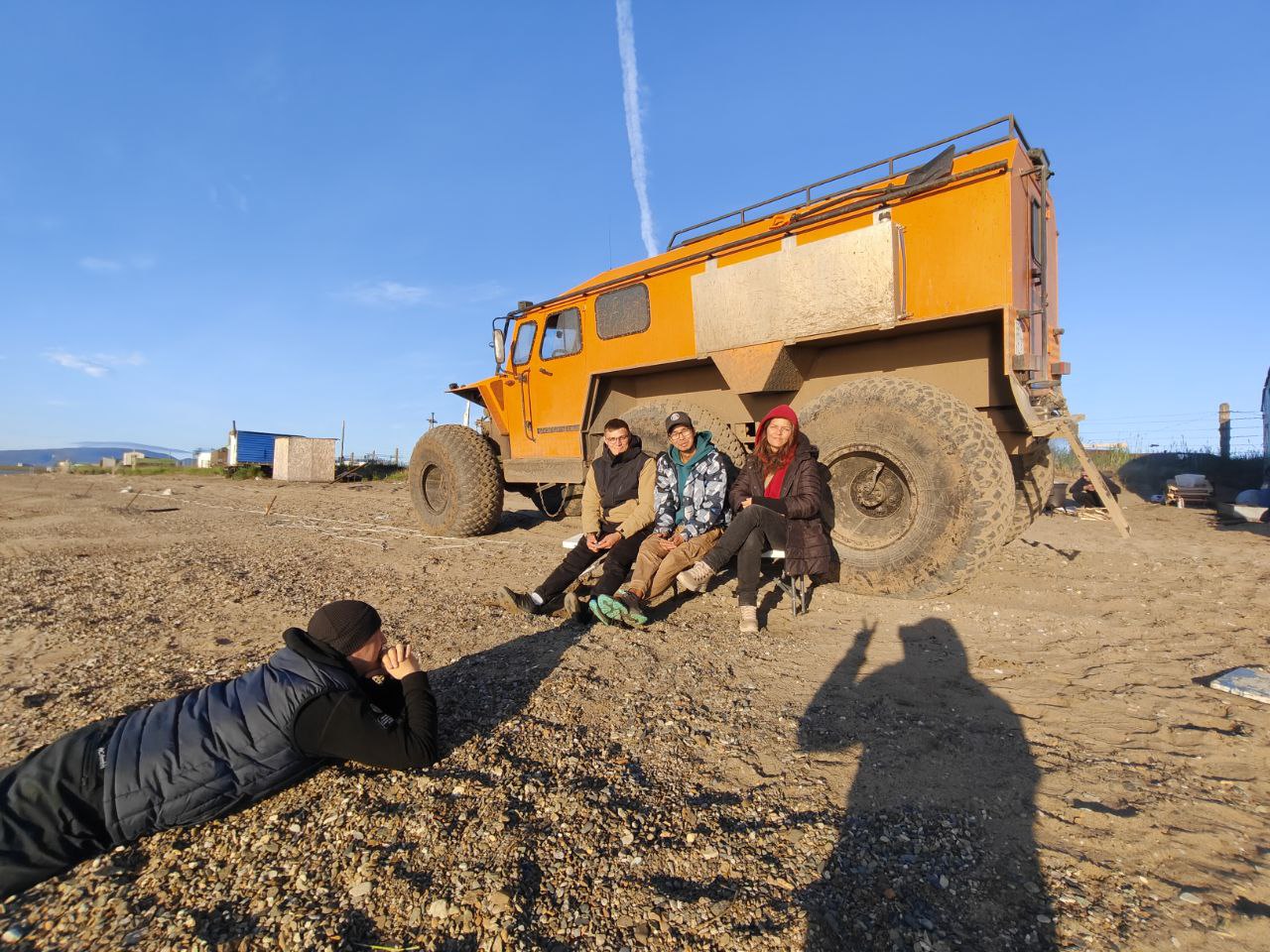 e. “No, it’s not a bear.” Skillfully, without taking his backpack off his shoulders, he shoved his flare back inside. “That’s some kind of spot, looks like a barrel. Bears don’t have spots.” The captain weighed the buoy Vasily had given him in his hands and headed toward the water. We trudged after him, already somewhat disappointed at the lack of a dramatic climax to our trip — the bear encounter.
e. “No, it’s not a bear.” Skillfully, without taking his backpack off his shoulders, he shoved his flare back inside. “That’s some kind of spot, looks like a barrel. Bears don’t have spots.” The captain weighed the buoy Vasily had given him in his hands and headed toward the water. We trudged after him, already somewhat disappointed at the lack of a dramatic climax to our trip — the bear encounter.
The heat from the fear we had felt was unbearably stifling. The sea gently and peacefully embraced the sandy shore. The captain fussed with the inflatable boat at the very water’s edge: “Shall we take a swim?” The cameraman shivered: “No way, that’s the last thing I need. You swim, I’ll just sit here.” “I don’t have a swimsuit!” The director gleefully discarded her clothes, tossing them right on the sand. “I call dibs on going naked, sorry in advance.” Completely naked on the completely bare shore, she headed for the sea. The captain smiled after her: “Don’t forget to make a wish before you dive in!” “I diddddd!” she shouted and plunged into the Bering Sea. “Goddamn it…” The cameraman shook his head and wandered off somewhere in search of the bag with the food we’d brought. The Arctic terns circled anxiously above him like a swarm of huge white gnats...